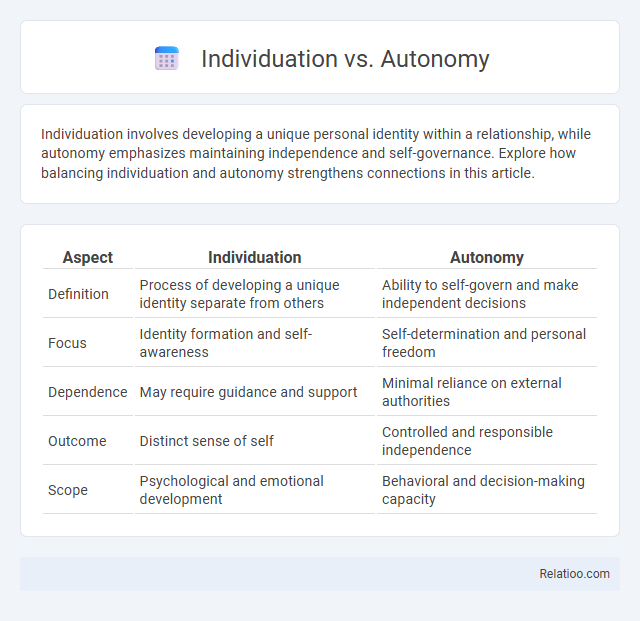Individuation involves developing a unique personal identity within a relationship, while autonomy emphasizes maintaining independence and self-governance. Explore how balancing individuation and autonomy strengthens connections in this article.
Table of Comparison
| Aspect | Individuation | Autonomy |
|---|---|---|
| Definition | Process of developing a unique identity separate from others | Ability to self-govern and make independent decisions |
| Focus | Identity formation and self-awareness | Self-determination and personal freedom |
| Dependence | May require guidance and support | Minimal reliance on external authorities |
| Outcome | Distinct sense of self | Controlled and responsible independence |
| Scope | Psychological and emotional development | Behavioral and decision-making capacity |
Understanding Individuation: Definition and Importance
Individuation refers to the psychological process by which a person becomes distinct and integrates various aspects of the self into a cohesive whole, a concept central to Jungian psychology. It is crucial for achieving self-awareness and personal growth, enabling individuals to harmonize inner conflicts and external influences. Understanding individuation helps clarify the distinction between autonomy, which emphasizes independence and self-governance, and mere separation, highlighting the complex development of a unique identity within relational contexts.
Defining Autonomy: Core Principles
Autonomy centers on self-governance, emphasizing the capacity to make independent decisions aligned with personal values and beliefs. Core principles include intentionality, understanding, and non-control, ensuring actions originate from authentic self-reflection rather than external pressures. This distinct focus on self-direction differentiates autonomy from individuation, which involves broader psychological integration and identity formation.
Key Differences Between Individuation and Autonomy
Individuation refers to the process of developing a unique identity and self-awareness, while autonomy emphasizes the ability to make independent decisions and regulate one's own behavior. Key differences include individuation's focus on psychological differentiation and self-realization, whereas autonomy centers on self-governance and personal freedom in actions. Your understanding deepens by recognizing individuation as internal identity formation and autonomy as external behavioral independence.
Psychological Theories Behind Individuation and Autonomy
Psychological theories distinguish individuation as the process through which you develop a unique identity by integrating various aspects of the self, while autonomy emphasizes self-governance and independent decision-making. Carl Jung's theory of individuation highlights the journey toward self-realization and psychological wholeness by reconciling conscious and unconscious elements. Autonomy, rooted in Deci and Ryan's Self-Determination Theory, underscores the importance of intrinsic motivation and personal agency in achieving psychological well-being.
Individuation in Child and Adolescent Development
Individuation in child and adolescent development refers to the process through which young individuals develop a distinct sense of self, separate from their parents and caregivers, while maintaining emotional connections. This developmental milestone involves recognizing personal values, beliefs, and identity, leading to increased self-awareness and psychological maturity. Autonomy, though related, emphasizes the capacity for independent decision-making and self-regulation, whereas individuation encompasses both emotional differentiation and identity formation within social contexts.
The Role of Autonomy in Personal Growth
Autonomy plays a crucial role in personal growth by fostering self-determination and intrinsic motivation, which are essential for individuation--the development of a unique identity separate from external influences. Unlike individuation, which emphasizes differentiation and self-realization, autonomy centers on the capacity to make independent choices and take responsibility for one's actions. Together, autonomy and individuation contribute to a mature sense of self, enabling individuals to navigate psychological development with greater self-awareness and empowerment.
Cultural Perspectives: Individuation vs Autonomy
Cultural perspectives reveal that individuation emphasizes the development of a unique self identity, while autonomy focuses on self-governance and independence within social contexts. Collectivist cultures often prioritize autonomy as fulfilling relational duties, whereas individualist cultures highlight individuation as personal differentiation and self-expression. Understanding these distinctions aids in appreciating how cultural values shape the balance between selfhood and social harmony.
Navigating Relationships: Balancing Individuation and Autonomy
Navigating relationships requires a nuanced balance between individuation and autonomy to maintain healthy interpersonal dynamics. Individuation emphasizes developing a distinct personal identity, while autonomy focuses on self-governance and making independent choices without undue influence from others. Balancing these concepts ensures individuals can assert their unique identity while respecting relational boundaries, fostering mutual growth and emotional intimacy.
Challenges and Barriers to Achieving Individuation and Autonomy
Challenges to achieving individuation and autonomy often stem from societal expectations, cultural norms, and internalized beliefs that limit self-expression and personal growth. Psychological barriers such as fear of rejection, dependency, and low self-esteem hinder individuals from asserting independence and developing a unique identity. Environmental factors, including family dynamics and institutional constraints, also play a significant role in obstructing the path to true individuation and autonomous decision-making.
Strategies to Foster Individuation and Autonomy
Fostering individuation requires strategies that encourage self-awareness, emotional differentiation, and personal identity development, such as reflective journaling and mindfulness practices. Autonomy is promoted through empowering decision-making, setting healthy boundaries, and supporting independent problem-solving to build confidence and self-efficacy. Integrating these approaches helps individuals balance personal uniqueness with self-governance, enhancing overall psychological well-being.

Infographic: Individuation vs Autonomy
 relatioo.com
relatioo.com